

Rhea (mythology) Rhea (or Cybele), after a marble, 1888.
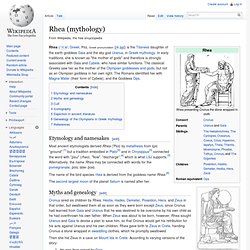
Then she hid Zeus in a cave on Mount Ida in Crete. According to varying versions of the story: Rhea only appears in Greek art from the fourth century BC, when her iconography draws on that of Cybele; the two therefore, often are indistinguishable;[10] both can be shown on a throne flanked by lions, riding a lion, or on a chariot drawn by two lions. In Roman religion, her counterpart Cybele was Magna Mater deorum Idaea, who was brought to Rome and was identified in Roman mythology as an ancestral Trojan deity. On a functional level, Rhea was thought equivalent to Roman Ops or Opis. Most often Rhea's symbol is a pair of lions, the ones that pulled her celestial chariot and were seen often, rampant, one on either side of the gateways through the walls to many cities in the ancient world. Selene. Names[edit] The etymology of Selene is uncertain, but if the name is of Greek origin, it is likely connected to the word selas (σέλας), meaning "light".[3] Origin[edit] Lovers and offspring[edit] Endymion[edit] "And the Titanian goddess, the moon, rising from a far land, beheld her [Medea] as she fled distraught, and fiercely exulted over her, and thus spake to her own heart: 'Not I alone then stray to the Latmian cave, nor do I alone burn with love for fair Endymion; oft times with thoughts of love have I been driven away by thy crafty spells, in order that in the darkness of night thou mightest work thy sorcery at ease, even the deeds dear to thee.
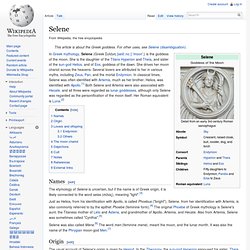
Others[edit] Phoebe (mythology) According to a speech that Aeschylus, in Eumenides, puts in the mouth of the Delphic priestess herself, she received control of the Oracle at Delphi from Themis: "Phoebe in this succession seems to be his private invention," D.S.
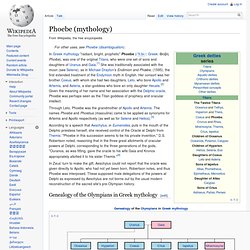
Robertson noted, reasoning that in the three great allotments of oracular powers at Delphi, corresponding to the three generations of the gods, "Ouranos, as was fitting, gave the oracle to his wife Gaia and Kronos appropriately allotted it to his sister Themis. "[4] In Zeus' turn to make the gift, Aeschylus could not report that the oracle was given directly to Apollo, who had not yet been born, Robertson notes, and thus Phoebe was interposed. These supposed male delegations of the powers at Delphi as expressed by Aeschylus are not borne out by the usual modern reconstruction of the sacred site's pre-Olympian history. Theoi.com: Phoebe.
Hecate. Ancient Greek goddess of magic and crossroads Hecate was one of the main deities worshiped in Athenian households as a protective goddess and one who bestowed prosperity and daily blessings on the family.[5] In the post-Christian writings of the Chaldean Oracles (2nd–3rd century CE) she was regarded with (some) rulership over earth, sea, and sky, as well as a more universal role as Savior (Soteira), Mother of Angels and the Cosmic World Soul.[6][7] Regarding the nature of her cult, it has been remarked, "she is more at home on the fringes than in the center of Greek polytheism.
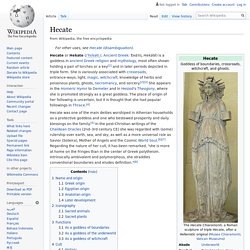
Intrinsically ambivalent and polymorphous, she straddles conventional boundaries and eludes definition. "[8] Artemis. Aphroditus. Aphroditus or Aphroditos (Ancient Greek: Ἀφρόδιτος) was a male Aphrodite originating from Amathus on the island of Cyprus and celebrated in Athens in a transvestite rite.
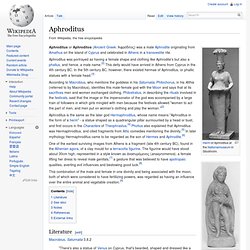
Aphroditus was portrayed as having a female shape and clothing like Aphrodite's but also a phallus, and hence, a male name.[2] This deity would have arrived in Athens from Cyprus in the 4th century BC. In the 5th century BC, however, there existed hermae of Aphroditus, or phallic statues with a female head.[3] Aphroditus is the same as the later god Hermaphroditus, whose name means "Aphroditus in the form of a herm" - a statue shaped as a quadrangular pillar surmounted by a head or bust, and first occurs in the Characters of Theophrastus.[4] Photius also explained that Aphroditus was Hermaphroditus, and cited fragments from Attic comedies mentioning the divinity.[5] In later mythology Hermaphroditus came to be regarded as the son of Hermes and Aphrodite.[6] Literature[edit] Theophrastus, Characters 16.10 See also[edit]